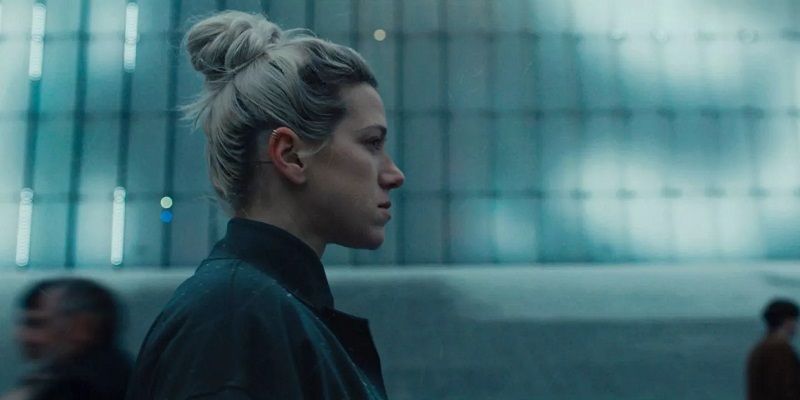
In 2041, a detective investigates a couple's murder when new technology
allows one of the victims to return from the dead.
Review by
Benjamin Poole
Directed by: Robert Hloz
Starring: Andrea Mohylová, Matěj Hádek, Václav Neužil, Milan Ondrík, Karel
Dobrý

Who of us has not experienced that singularly shameful phenomenon of
being asked, upon the inevitable death of an ageing laptop, by a smugly
chastising mate who is good-with-IT, the damning question, "When did you
last back it up?" "Christ knows," you answer, as your pal gleefully
preps a well-worn riposte shaming the poor frequency of your
reduplication practice. Whatever, nerd! I'm too busy going to discos and
hanging out with hip people to bother with square pursuits like backing
up Word documents! But what if my, or your (because I know you're too
cool, too), life depended on it? What if you were backing up YOUR ACTUAL
LIFE?!

This is the zippy premise of Robert Hloz's (writing duties shared
with Tomislav Cecka and Zdenek Jecelin)
Restore Point, an enjoyable Czech sci-fi thriller built around the gimmick of a
"restore point": wherein humans who have "died unnaturally" can be
brought back to life via a backup of their character self-created within
the last 48 hours - "cell alignment" being the reason for such narrative
urgency (starting this review I checked when my last laptop back up -
all my wonderful musings on film, etc - was: September 2023! I'd be
fucked).
The familiarly Dickian concept is one which readily lends itself to
malfeasance and conspiracy. The institution which administers the
restore point service is in thrall to corporate interests, there is an
activist group - River of Life - who are against the procedure, and a
key architect of the radical process, David Kurl (Matěj Hádek),
is discovered murdered to death along with his wife... with their most
recent restore points erased from the universal hard drive. Cue
Detective Em Trochinowska (Andrea Mohylová - European variant of
Scarlett Johansson), a cop driven, along with a shoddily backed up David
(pushing past the 48 hour limit with unaligned cells), to unpick this
particular chronology of a murder...

Part of the fun of Restore Point is how cheerfully
derivative it is. The obvious reference points are
Blade Runner and Minority Report, with Stanislav Adam, Anton Evdoshenko AND Filip Marek's
cinematography (IMDB credits all three, fair play for such a visually
pleasing film) replicating the latter film's modernist olive palette
(Philip K. Dick is perhaps the writer whose work is most literally
"adapted" for cinema, with movie versions often eschewing the mindfuck
psychedelia and sly humour of the novels: true to form,
Restore Point is a further dilution). Em is cast in the
Clarice Starling mold; a lone, striking female detective who not only
labours under a cartoony police patriarchy, but has a customary habit of
entering foreboding houses alone. David's predicament - solving his own
murder against the clock - is a noirish conceit.
Nonetheless, the other, more distinct, pleasure of
Restore Point is how good looking it all is. In tighter
shots, the cast are sleekly dressed in designs which give just the right
feel of futurism (courtesy of Ivan Stekla's costumes), while in
wider indexical frames Hloz pores over the looming curves of a high-rise
city where the gleamingly advanced CGI geometries co-exist with
preceding architecture (an importantly convincing detail which most
films of this ilk overlook). As Restore Point dashes
through dynamic, deeply coloured set pieces - in the thickening of the
plot we move from artificial urban fronts to the earthy honesty of
forests and mud - it is never less than gorgeous to look at.

The problem with Restore Point is that, aside from some
last act rug-pullery, the concept of restore points, of safety
lifelines, is not fully surveyed in ways which would consolidate the
film. We may politely overlook that the specifics of the method are not
expounded (who decides what is natural or otherwise, etc), but what
about the wider effects of this revolutionary process? Would society as
a whole be less risk averse, for example? It is a missed opportunity
that these compelling ideas are not touched upon, as without such
thematic exploration Restore Point reduces to a chase film
with fun science fiction polishes. Fast paced, sincere and sumptuous,
Restore Point is an entertaining watch, albeit one which
doesn't back up its own intriguing premise.

Restore Point is on UK/ROI VOD
from April 1st.

